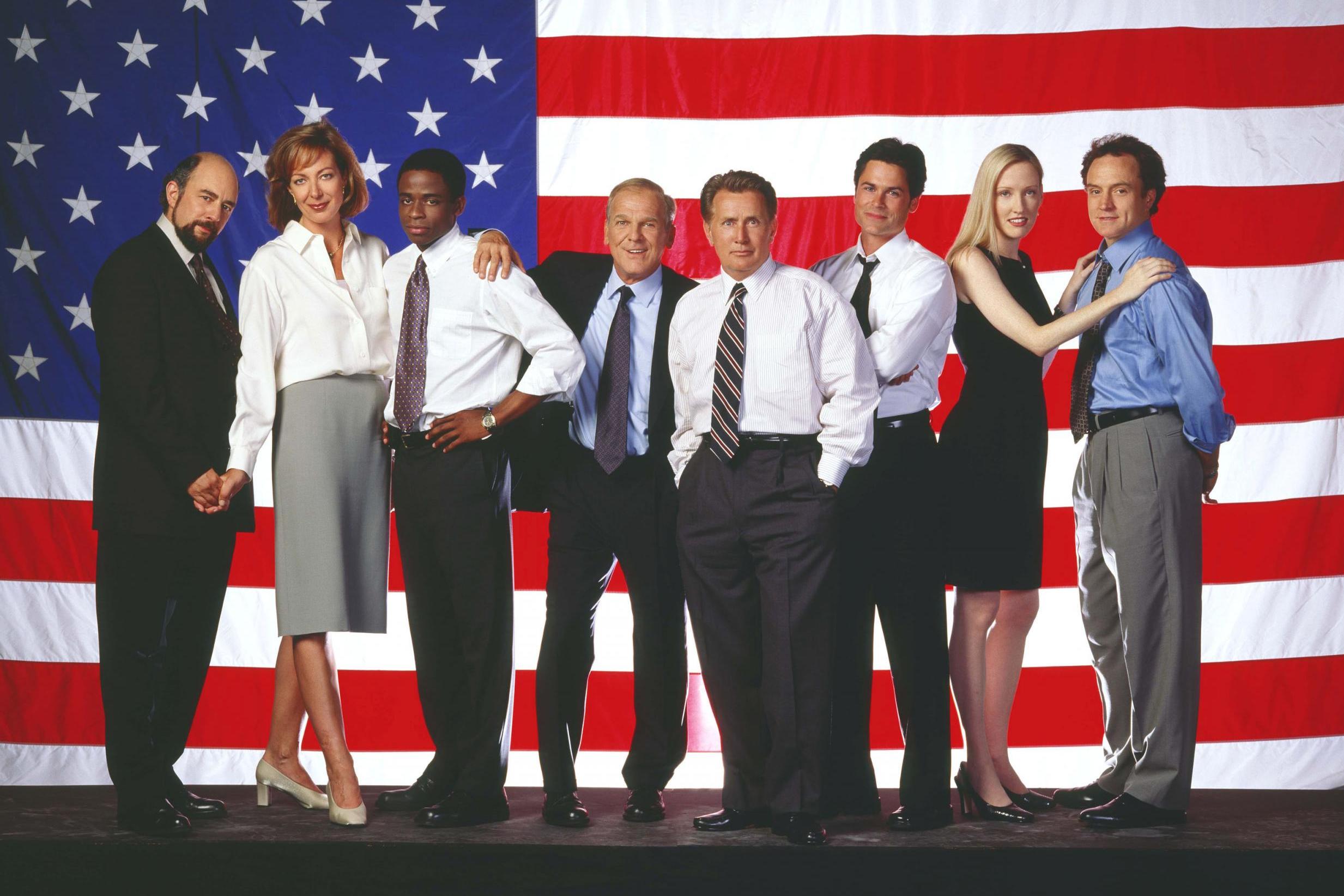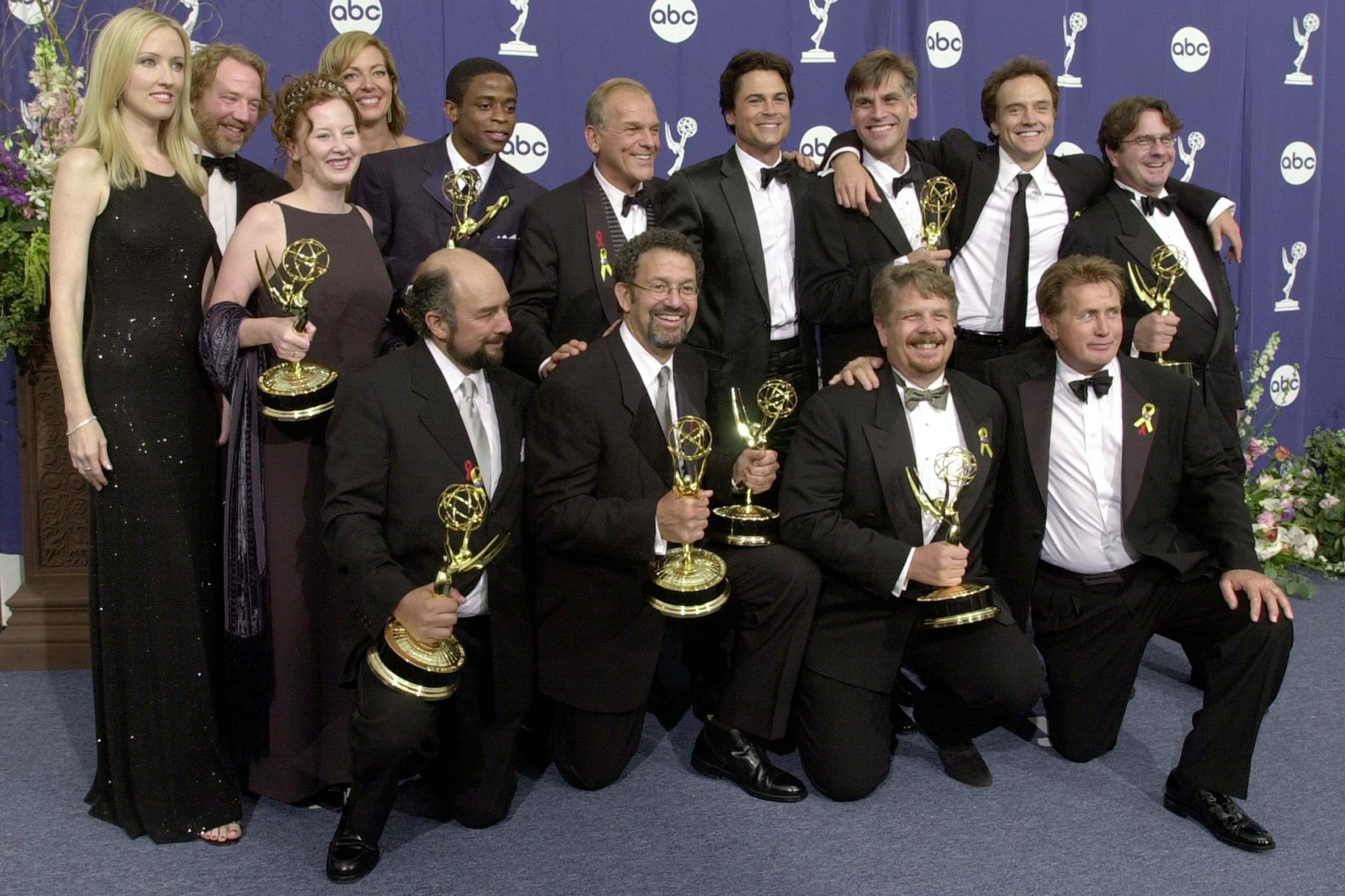12 West Wing episodes that are ultimate therapy for the Trump era
When the real White House is too much to bear, there's always the sweet embrace of Aaron Sorkin's fictional Oval
Twenty years have passed since the first episode of The West Wing aired, but some chapters of Josiah Bartlet's presidency seem more relevant than ever.
The show, which ran from 1999 to 2006, offered a refreshing portrayal of Capitol Hill by infusing a strong sense of morality and righteousness into the gritty world of DC politics.
Some episodes of Aaron Sorkin's political drama may thus bring solace to those seeking to escape the chaos of the Trump White House and the contentious news cycle that has spun since the Republican candidate's election in November 2016.
From the appointment of a progressive Supreme Court justice to a president's fight against bigotry, here are 12 episodes doubling up as therapy for the Trump era.
The Supremes – season five, episode 17
In this episode, which originally aired in 2004, the Bartlet administration must find a suitable replacement for Supreme Court Associate Justice Owen Brady following his sudden death.
Deputy Chief of Staff Josh Lyman suggests Evelyn Baker Lang (Glenn Close), a judge initially deemed too liberal to be confirmed.
"The conservative anchor of the Court has just died, a young, brilliant thinker, who brought the right out of the closet and championed a whole conservative revival," Lang herself says at one point.
"You cannot replace Owen Brady with a woman who overturned a parental consent law, you'd be shishkababed and set aflame on the South Lawn. Two reporters, three reporters have walked by since we started. I'm window dressing, that's fine. I'm happy to help, but let's just chat about the weather."
The situation closely echoes the controversy over the replacement of Antonin Scalia, who died in February 2016.

Watch Apple TV+ free for 7 day
New subscribers only. £9.99/mo. after free trial. Plan auto-renews until cancelled.
ADVERTISEMENT. If you sign up to this service we will earn commission. This revenue helps to fund journalism across The Independent.

Watch Apple TV+ free for 7 day
New subscribers only. £9.99/mo. after free trial. Plan auto-renews until cancelled.
ADVERTISEMENT. If you sign up to this service we will earn commission. This revenue helps to fund journalism across The Independent.
Barack Obama picked Merrick Garland, a moderate liberal, to replace him, but Senate Republicans refused to consider his nomination.
Neil Gorsuch, a conservative, was nominated by a newly elected Donald Trump in January 2017 and confirmed in April of that year.
In The Supremes, Lang eventually makes it to the Supreme Court, not as associate justice, but as its first female chief justice.
The Midterms – season two, episode three
Back in 2000, The Midterms featured an iconic sequence in which President Bartlet publicly confronts a religious fundamentalist radio host over her bigotry.
As he gives an address related to the ongoing midterm elections, Bartlet, himself a devout Catholic, spots Dr Jenna Jacobs in the crowd.
The president publicly confronts her about homophobic statements Jacobs has made on her show, in which she has called homosexuality an "abomination".
When Jacobs argues that the assertion came from the Bible, Bartlet makes several specific references to the scriptures to highlight the many ways in which most people take liberties from them on a daily basis.
"While you may be mistaking this for your monthly meeting of the ignorant tight-a** club, in this building when the president stands, nobody sits," he says at the end of his tirade, which exemplifies how those in position of power can take a stand against discrimination.
Let Bartlet be Bartlet – season one, episode 19
In a plot line that will sound reminiscent of many present-day headlines, a scathing internal memo in which a White House insider criticises the president is leaked.
The press gives the document, which paints Bartlet as too shy to make bold decisions, ample coverage, putting the administration in a difficult position.
Bartlet and his staff eventually realise that the president has too often ignored his principles to play politics, meaning his administration now appears inefficient.
Chief of Staff Leo McGarry eventually comes up with the catchphrase "Let Bartlet be Bartlet", a motto that captures the need for the president to stand up for what he thinks he's right.
The team then resolves to elevate the public debate and stick to their positions, even if it costs Bartlet re-election.

Bartlet for America – season three, episode nine
Flashback sequences reveal how Bartlet, then governor of New Hampshire, came to run for president.
McGarry, his best friend and future chief of staff, is the one who comes up with the slogan "Bartlet for America" and writes it down on a napkin.
The episode also deals with Bartlet's multiple sclerosis diagnosis, and whether it was sufficiently disclosed at the time of his run.
As such, it sheds light on how a political campaign can continue to affect a presidency well after Election Day, in addition to offering one possible answer to the question: "Exactly how does one decide to run for one of the most powerful political offices in the world?"
In Excelsis Deo – season one, episode 10
This Emmy-winning Christmas episode, which earned Aaron Sorkin and Rick Cleveland the Outstanding Writing for a Drama Series gong, tackles serious matters – as is customary in The West Wing – yet has a distinct feel-good tone.
It brought awareness to the issue of homeless war veterans, through a story line in which a Korean War vet is found, having frozen to death on a bench.
White House Communications Director Toby Ziegler (Richard Schiff, who won an Emmy for his portrayal of Ziegler), pulls strings to organise a military funeral for the former Marine at Arlington National Cemetery. Bartlet only lightly reprimands Ziegler when the communications director admits to using White House resources to set up the burial.
Mrs. Landingham, Bartlet's presidential secretary, decides to attend the event. In a moving scene, she reveals her twin boys were drafted for the Vietnam War while in medical school and died within four months on Christmas Eve 1970. This is the first big reveal concerning Mrs. Landingham's backstory, and it's a tragic one. Coupled with Ziegler's efforts to give the late veteran a proper send-off, the episode reads at many times like a lesson in empathy.

Game on – season four, episode six
In a now iconic sequence, Bartlet, who is debating his Republican opponent Robert Ritchie, challenges the idea that political campaigns should fit into neat sound bites.
After Ritchie delivers a 10-word answer describing why he thinks tax cuts are warranted, Bartlet urges him to describe just as succinctly how he plans to accomplish that.
"Give me the next 10 words, how are we going to do it? Give me 10 after that, I'll drop out of the race right now," he says.
"Every once in a while, every once in a while, there's a day with an absolute right and an absolute wrong, but those days almost always include body counts.
"Other than that there aren't very many un-nuanced moments in leading a country that's way too big for 10 words."
Bartlet's tirade is a testament to the complexity of politics, and a rallying cry against populism.
The fictional debate is also a throwback to a time where political opponents didn't hurl demeaning nicknames at each other (see Trump's "Little Marco" aimed at Florida Senator Marco Rubio), nor did they step away from their lectern to loom behind their competitor (as Trump did during his second debate against Hillary Clinton).
Shutdown – season five, episode eight
Bartlet locks horns with Speaker of the House Jeff Haffley when the latter unexpectedly challenges previously agreed-upon cuts to government funding.
The disagreement leads to a government shutdown and leaves an uncompromising Bartlet sticking to his position until the other side caves.
While it aired for the first time in 2003, this episode still feels educational 15 years later – especially at a time when the White House has threatened a possible government shutdown if he doesn't get funding for his border wall.
2162 votes – season six, episode 22
Set during the Democratic National Convention, this episode sees Bartlet's party scramble to pick its presidential candidate.
When the possibility of using one candidate's wife's depression against him, Matt Santos refuses, instead giving a rousing speech reminding the audience that "we're all broken".
"Don't vote for us because you think we're perfect," he urges the crowd.
"Don't vote for us because of what we might be able to do for you only.
"Vote for the person who shares your ideals, your hopes, your dreams."
The episode serves as an educational deep dive in the uncompromising world of political campaigns, and is also another vehicle for the show's signature mix of politics, ethics, and emotion.
20 Hours in America – season four, episodes one and two
While President Bartlet gives a speech in Indiana, Communications Director Ziegler and Deputy Chief of Staff Lyman chat with Cathy, a farmer played by Amy Adams.
Ziegler and Lyman end up missing the motorcade, along with Lyman's senior assistant Donna Moss.
The three are thus left to try to return home, and in the process, learn more about rural Indiana and its culture – in a two-part instalment that shows just how refreshing it can be to see politicians trying to survive far away from the confines of Capitol Hill.
Isaac and Ishmael – season three, episode one
This episode, which originally aired in October 2001, was an early response to the 9/11 attacks by a work of fiction, occurring less than a month after the fact.
While Lyman and Moss visit a high school, the White House goes on lock-down.
Students then ask the duo pointed questions related to religion, anti-American sentiment, and terrorism.
Lyman takes a firm stance against prejudice, and instead prompts the group to reflect further on the topics.
"Islamic extremist is to Islamic as 'blank' is to Christianity," he says, asking the students to complete the sentence.
He then reveals that "blank" stands for "KKK" before launching into an explainer about "Islamic extremism".
Isaac and Ishmael, which came together over the course of just two weeks, has been criticised for being preachy and lacking a sophisticated plot, but many still remember the sequence as striking.
"The episode wasn’t great, but it was a noble experiment, and despite itself, made some pretty salient points," the AV Club noted.
And It's Surely to Their Credit – season two, episode five
When Bartlet hires Ainsley Hayes, a conservative commentator, as a legal counsel, his staff initially recoils.
Seeing Hayes carve herself a spot in Bartlet's progressive White House is an interesting exploration of bipartisanship on the small screen.
While Hayes was a controversial character, both in the show and in some viewers' minds, her story line remains a valuable study of what happens when leaders reach across party lines.
The US Poet Laureate – season three, episode 17
Bartlet is caught making a disparaging comment about the potential Republican nominee.
The – rather eloquent – gaffe, during which Bartlet calls his opponent a ".22 caliber mind in a .357 magnum world" is deemed so outrageous, however, that it sends the president's staff in a frenzy to spin the incident in his favour.
One of their concerns is to retain the approval of his supporters, who could presumably be so shocked by Bartlet's choice of words they would turn his back on him – in a story line that seems almost endearing at a time when insults have become a routine part of the White House discourse.
Celebrate the 20th Anniversary of The West Wing with The West Wing: The Complete Series Collection available at the WB shop
Join our commenting forum
Join thought-provoking conversations, follow other Independent readers and see their replies
Comments
Bookmark popover
Removed from bookmarks